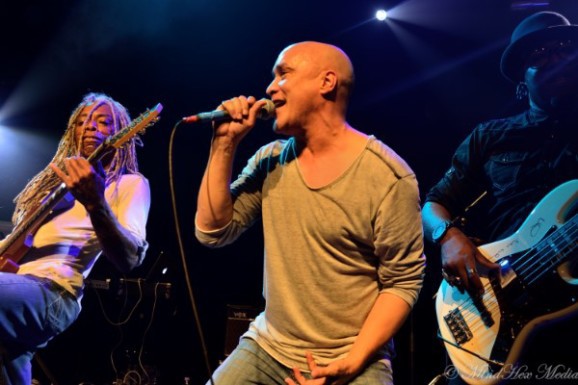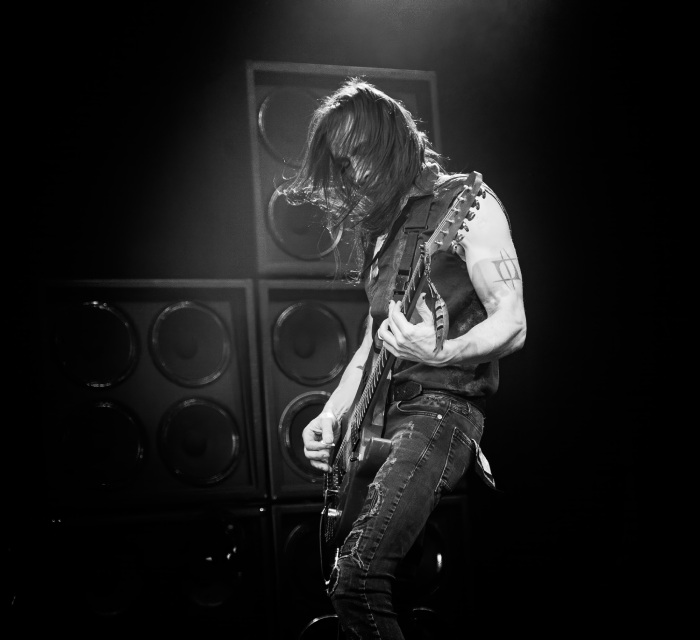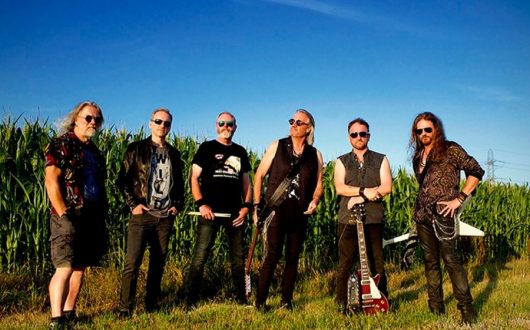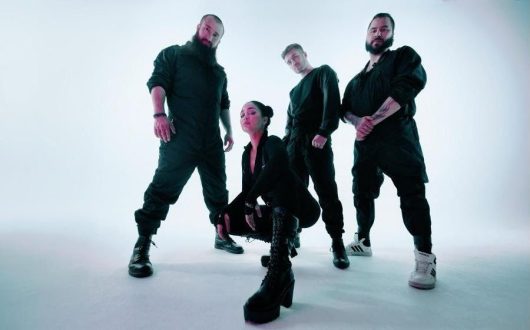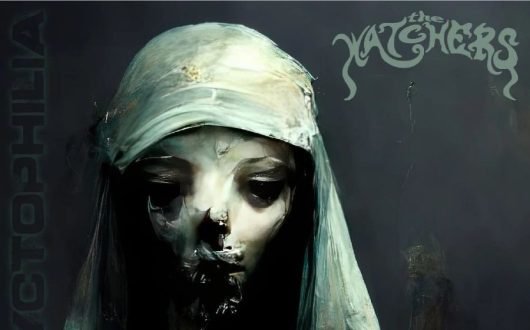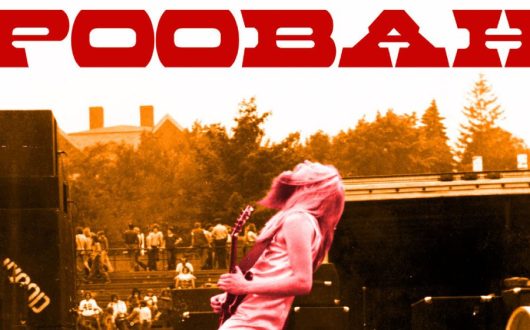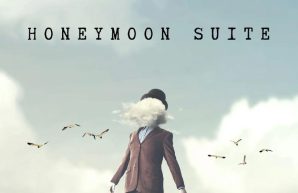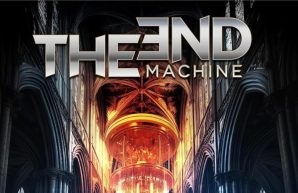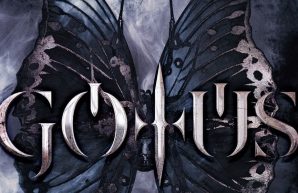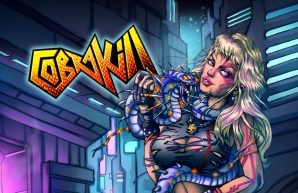Interview by Adrian Hextall (writer \ reviewer \ photographer – Myglobalmind Magazine)
Dan Reed Network are back. Of that there is no doubt. A musical wilderness, that saw Dan Reed enter a Buddhist monastery, tear up all of his contacts in the music industry, live in India and Jerusalem before finding his musical muse again and slowly re-emerging into the light, is all forgotten now as the band enter their 3rd year since a ‘one-off’ show on NYE in Portland. The new lease of life, a son and a new album with Frontiers Records in the pipeline, means that Dan has, not surprisingly a lot to say right now. The first of our two part interview is below;
MGM: I would love to start, if you don’t mind, with a little bit of history. The thing that got me into Dan Reed Network many years ago was a review in Metal Hammer that advised me; “If you have an ounce of dancing blood in your veins, I will fall under the charm of the Dan Reed Network”.
It was one of those sentences that resonate and you thought ”I have to give this a lesson”. There was so much on the cover articles about fresh bands and the really heavy music at the time. DRN came out of nowhere with this completely new style and hit the ground running. Over the next five years you went from strength to strength for the each of the albums as they came out. By the time ‘The Heat’ comes out in ’92, you were all on the top of your game. Then you stop…..
DR: I guess everyone was just really burned out from being on the road because even before we got a record deal, we were playing shows for almost four years. So we were playing all over the North-west and three or four or sometimes five nights a week. Then we got our deal, then things were like a whirlwind but we were still on the road constantly… I think for the next four years pretty much. We lived in a studio somewhere, not at home. Months away there and then immediately on the road either as an opening act or on smaller tours of our own all over the Europe and the States. Looking back I guess I was home maybe one month out of the year for the next four years. I think it was right after The Rolling Stones tour, I was really getting burned out by the whole thing and I felt like I just wanted to take a year off. That turned into me just enjoying my life so much more. So I ended up just staying home in Portland. What I did is I started studying acting, I did about three or four plays in the course of two years and then I did a feature film that I wrote and acted in. That was a two and a half year process from writing to actually releasing it. And then I found some partners in a Portland Night Club. That was in 1999.
MGM: Was that Club Ohm?
DR: That’s correct. I owned that from ’99 to early 2003 so I was there about four years and then I did construction work for a year, building houses to clean my act up because I really started getting addicted to drugs and alcohol during the night club days. It’s something I never was during the band days or theatre days, I never touched that stuff. And then, after a year of construction work I decided I was going back to India.
I went the first time when I quit the music business around ’92. I went to India and interviewed the Dalai Lama for a magazine and I just felt like there was so much more to be discovered out there other than playing music and being on the road and living in hotels. I wanted to study different faiths, different religions, but I never had the time to do it. So after I did the construction work, I was clear headed, I realized I wanted to go back to India where I wanted to interview his holiness and spend time there. I committed myself to 12 months up in the Himalayas. I met these wonderful Tibetan monks. They invited me to live in a monastery with them there. I stayed there for about seven and half months and then I just toured around India for another eight months, something like that, kind of putting into practice all the things I learned at the Buddhist temple.
Tibetan Buddhism is a little different than in India and Thailand but Tibetan Buddhism is I think probably the purest form of it because they’ve been the most..I think they’ve kept it the most sacred, more than any other place in the world. They really took it seriously to heart, the Tibetans. And that’s a whole another story…… It’s really fascinating how they adopted Buddhism up there.
I started writing music again while I was living in a monastery oddly enough. And it was because the monks asked me to teach them some rock and roll songs. One monk asked me if I knew the song and he started similar drum beat to ”We Will Rock You” but he didn’t know what the name of the song was and I was like ”How do you know the song?”. And he goes ”I heard it one time on a tourist’s radio and I’ve always wanted to know what the guy was singing about”. So what started me getting back into music was that conversation. I went and printed the lyrics out in this internet cafe in India and bought an acoustic guitar at this pawn shop so I could teach them some rock and roll songs. So, I started writing again at the monastery really quietly in my room. Mostly poetry, writing concepts of what I wanted to sing about and then they said ”You should get out and play music again”. Either that or become a full-time monk and I wasn’t well prepared to do that (he says with a smile in his voice but clearly looking at his eyes, he’s considered it).
When I left India, I moved to Jerusalem. I was just going to go visit some Israelis that I met on my travels in India for a maybe a few weeks or month. But I met this woman and we clicked, she was amazing. I wanted to go to Israel and see what that was all about and if there was some kind of connection between her and I. But I didn’t end up staying. We had a relationship for a short while, a couple of months, but we’ve then become great friends instead. But I just fell in love with Jerusalem so I moved there and I built a recording studio with the help of another person that was living out there and they helped produce a new album with me.
I spent three and a half years there in Jerusalem, writing songs, working with Palestinian musicians, Israeli musicians. That led me up to 2008 when Barrack Obama was running for president and I was really excited about that. I was just releasing my new album, my first solo album. So I decided to move back to the States. I wanted to go and try to do some fund raising and awareness raising for this Obama fellow and get back into the scene a little bit and Jerusalem is quite remote to allow me to do that. So I moved to New York and I spent about nine months there, I got burned out on that, I moved back to Europe and spent three years in Paris and now I’ve been in Prague for about four and a half years. So that’s been my whole life since the Network days.
MGM: Do you feel settled now?
DR: Yes. I’ve got to say, with the birth of my son, everything just made sense finally. I was searching for so long for some kind of foundation or foundational thought process or a way to approach life. Religions were only answering a piece of it for me, sexual relationships were answering a very small piece of it, and friendships and love relationships and all that stuff were there and poignant and part of my life but I still felt like there was a huge hole inside of me that I couldn’t fill. It didn’t matter what I did, whether it was theatre, music, or drugs or alcohol, it didn’t matter what I tried to do, it was always not the dead end but it definitely was a dark alley and I was like ”What’s going on here?”.
The happiest time I’d ever had up until the point my son was born was actually the monastery. There was no electricity, no hot water, no women, none of that, no distractions, no TV, no cell phone, no internet, and all you’re doing is working on trying to find a deeper connection to compassion, gratitude, letting go of remorse, guilt, envy, these things just trying to calm the mind. And I got to a point there at the end of the seven months I was there was a really blissful experience where I had such a deep appreciation for being able to breathe, being able to eat food, being able to laugh or have a conversation, to be able to be a human being on this planet. Where you take it for granted if you’re living in the western world you’re on a treadmill paying your bills, going out to party and hang with friends, got meetings to go to and that kind of stuff and that to me was really draining my soul.
Since I left the monastery, I’ve been able to manage all that stuff so much easier. But there was still a hole even though I had these tools I could use to go through life and I was writing these songs that I felt was the best work I’d done which was ‘Coming Up For Air’ and then ‘Signal Fire’ and I really felt still hollow in some ways and then my son came into world. It was crazy. Do you have children?
MGM: Yes. A daughter, she’s 9 now.
DR: You know. You’re no longer number one since the moment they take their breath, that they’re the priority number one now. It’s no longer your ego or your insecurities or your confidence. None of that stuff matters any more, it’s just about the need to make sure that person is safe and sound and raised in a way that they’re going to be hopefully open-minded. That’s my approach to it. Ever since he’s been born I take better care of myself now because of it, because I want to be around.
MGM: The change in perspective and renewed look at life as a result of your travels, your studies and of course the birth of your son has brought you full circle to some degree and the Network is now in its third year following the reunion. For us in the UK, everything kicked off at the Enchanted Festival. An interesting event, location (Greenwoods Hotel Spa and Retreat in Essex)
DR: Yes, it was Chris and Gavin, my partners on that. I played at Gavin’s wedding party, not his wedding but his wedding party and I just had such a great experience playing for all of him and his friends and his family. I met them through one of the house concerts I do.
Then Gavin booked me in that hotel to stay (Greenwoods). Chris and I sat in the bar and it was empty and it was 1-3 in the morning and we just had a couple of drinks and we said ”Let’s look around the grounds here a little bit”. We started walking around and I said ”You know what would be great? Do a festival here”. Some kind of an event because it’s so charming and it’s just built for a perfect space we can do a small room in the hotel lobby area, put artists by the fireplace in the main hall and hit the big wedding tent out there with the main bands. That just blossomed into, I guess it was about a year later, to where we had some other bands that we’re going to do it and then we just said ”Why don’t we have the Network play?” We had just played at New Year’s Eve in Portland and the Network had no more plans to ever play together again. So it was going to be somebody else. And then soon as the Network was going to play, we looked at it as our reunion show for the UK. A great way to start the festival because we wanted to do it annually. And oddly enough, which is so weird is a year later, exactly one year later we had a whole bunch of people, we had the Quireboys booked.
MGM: You I recall that the Quireboys was certainly on that second year list.
DR: And Roachford, full band Roachford. (Of Cuddly Toy fame)
MGM: How good it would’ve been to see them playing as well.
DR: It’s just a bunch of great acts we had lined up on that thing. But, about 90 days before the festival we’d sold just 29 tickets. So we just cancelled it because we were going to be in a hole for about £17 000 had we moved forward with van fees and PA and light rentals and fee for renting the space. And so if we sold lest than 100 tickets it would not only be embarrassing and bad for bands to play for that many people but it would’ve been a huge expense for the three of us, Gavin, Chris and I. So we just pulled the plug on it and we said maybe we’ll try to do it again in the future but we have to rethink the process. Maybe it should be just something that the Network plays every two years.
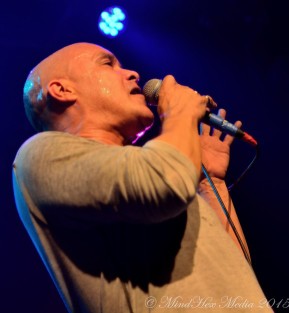
MGM: You certainly were the crowd puller in the first year. A lot of people travelled for that (as did I). Thankfully, the band has continued even if the festival is on hiatus. I presume it doesn’t feel like reunion any more. It just feels like the norm now?
DR: We do it twice a year maybe. Now we go off for three weeks or a month or even less for twice a year and that might be more with the new album coming out but it won’t be any more than three times a year. The rest of the time we’re doing all of our own stuff. It definitely feels great and now Blake had to leave the band for family matters back home, we have Rob Daiker who’s my co-producer on my solo stuff. He’s an amazing singer, song writer on his own and he’s a great keyboard player, a guitarist and now he’s been with this, I think the band sounds really tight now. It’s really in a good position and we are starting the new album in November in Portland, Oregon and Rob’s co-producing the album which makes perfect sense.
MGM: You and he know each other so well you must be able to bounce off each other after working on your last few albums.
DR: The Network is a good ship right now. And everybody’s really involved, we’re really having a great time.
MGM: Were those first couple of shows difficult without Blake?
DR: They were just surreal because he was always on stage with us whenever we were together and I’d always sworn before, that I would never do a Network tour or a new album if it wasn’t the five of us. But that was only based on if everyone’s available but someone chose not to do it. Then it would feel like false. But the fact that he had to leave under those kinds of circumstances and the fact that Rob is such a good connection and close friend of us to the band that it seems fine. And the audiences seem to be loving it. In fact, we just played that Rockingham festival (Nottingham Rock City, 3 day melodic rock festival) and I’ve read a few reviews sent to me from blog writers and several said that we were the best band on the whole weekend. So I think it has a lot to do with how good we’re playing together as a group right now. It’s not so showy now, it’s more just full on musicianship. And everybody is loving it.
MGM: The crowd got into the groove and it’s the thing you guys bring to the stage, isn’t it? That groove feeling.
DR: I saw some comments on the reviews saying that ”I haven’t danced that much since I was a teenager”, in Rockingham. And that’s a good compliment, to hear those kinds of things. And then I met a lot of people after the show, I came out and signed CDs and took photos, and then we went to this other bar called the Crown Plaza Bar and there was maybe at least 100, 150 people, some of the festival. And they were all just coming around to just say the nicest things that the many of them have never heard of us or never heard us play live. They said ”I know I heard of you guys back in the day but I was such a metal head that I thought you guys were a bunch of wusses, a bunch of pussies, the Network”. And I said ”Yeah, I understand it because I watched you guys tonight, you just rip my head off saying it was my favourite band of the weekend”. We’re just doing what we can do.
MGM: Which just proves that the Metal Hammer review from the late 80s was right on the money.
DR: Yeah. And then our first album that we did with Bruce Fairbairn and Mike Fraser engineering is still to this day considered one of the better sounding records because of how it mixed technology and live instruments because a lot of people hadn’t done that. There was Sly and the Family Stone and Red Hot Chilli Peppers, and there were groups like that that were really funky and from different areas but they were all live players. And you had people like Prince but he was a full on drum machine sounding song or full on band sounding song. And I think the reason why the Network was such a good mixture of that was because we were all fans of different styles of music, the members of the band. But everyone in the Network listened to Scritti Politti, remember that band?
MGM: Yes.
DR: I remember there I was, listening to Scritti Politti going ”Man, I just love the keyboard parts in this group. If it didn’t just sound so processed and sound so mechanical”. I really did but if you listen to Scritti Politti now and you listen to the Network’s first album you’ll hear me just ripping that stuff off , keyboard part of wise. I’m not stealing parts but I’m stealing rhythms and way the keyboard parts play. What rock bands have, keyboard hook parts you have to hear [alongside the singing], but the funky keyboard parts were me just trying to mix different styles in.
MGM: Ritual from the début album would be a great example I would say?
DR: For sure. Those keyboard parts, they sound like they’re from a jazz band at times. The hard thing now is like writing for the new Network record. That’s what I’ve been doing in the last nine months, when I’m in between shows I’m in my studio at home, writing new stuff. And so far the band seems to like it a lot but we’re working with Derek Shulman again. He’s managing it with his new management company so he got us the deal with Frontiers, and we’ll release it with them. So he’s trying to help us make this record the same way we did with the first one. And he keeps coming to me and going ”I love the new demo that you sent”, I keep sending two or three at a time and he goes ”I love it, I love it, I love it, but where is ”Get To You”, where’s ”Get To You”, so the last time he wrote to me I said ”Why don’t we just cover the ”Get To You” and then just redo it in 2016 version”.
MGM: Just to give people something to hook onto, bringing the old to the new?
DR: If that’s what you need.
MGM: Is the style changing? Do you feel it is a different sound now?
DR: Yeah, I think it’s very similar to ”Slam” and maybe a little bit of the début record. I don’t think it’s anything like ”The Heat” really because on ”The Heat”, I started mixing it in more acoustics and electrics and electric guitars and started getting away from the band sound. I don’t actually listen to that album very much but the new album is going to be more reminiscent of our first two albums and lyrically I think it’s just a little darker maybe but still celebratory melodies so people can still sing along and party and dance but it’s just a little deeper intention I hope.
MGM: In terms of the lyrical content, when you went back to the States at the point Obama was running for President, you’ve made a point of raising awareness of things that are going on in the world, and ever since you’re using social media to that effect as well. Does that now roll into the lyrical content as well?
DR: Yeah. I think so. So far every song that I’ve written for this new album is a metaphor in one way or another of trying to make sense of the chaos, try to find some kind of positive thing off of the negative whereas ”Get To You” is just about singing and going to walk down the street. I would say ”Get To You” of 2016 would be about seeing an idea that’s on the horizon as opposed to a woman’s ass. So I think it’s an idea that you wish you could embrace or that you’re afraid to embrace because it doesn’t seem popular or something but it’s something that we still chase, and ideal in a way to live more in balance with our neighbours and with the planet we’re given to live on. I’d say it’s definitely more about rooting in that intention but I think it’s hopefully all there in the metaphors and stuff. It’s not a preachy record by any stretch of the imagination. It won’t be.
MGM: If you just listen to it you can enjoy it but if you want to look for the deep meaning, it’s not hard to find it?
DR: That’s exactly my hope. Whether we get there or not you’ll have to be the judge of that.
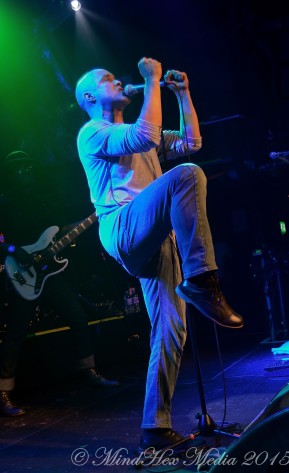
MGM: What about the earlier tracks then? Is there anything in the earlier works when you look back on your lyrical content and think, ”it’s just too superficial, I don’t really want to play it any more”?
DR: Yeah, for sure. But we play them even though, you know “Tiger In A Dress”, that’s a great example. I’ve been asked to play that over and over again over the last six or five years and I never played that. And I didn’t play that on the Network tours, I was just like ”This song is killing me” and finally I said ”You know what? It’s a snapshot of a time period and so we should play it”, and I have to meditate on it just for six seconds before the song starts. I consider when I wrote it and why I wrote it and just play that role live and people love it. I’m just going nuts. I’m having a great time singing it. I definitely couldn’t sit down and write the lyric like that. I couldn’t do it for us any more. If it was, let’s say another band of 20-year old kids, like the band I’m producing or something or they wanted me to write a song for them, I could get into those shoes and try to write a song that’s more based from their point of view and their life experience. But for me to do it as an actor now for the Network, for guys that are 50+, I mean we are all over 50 now. Rob, the new keyboard, he’s getting in his 46 or something like that. To write a song about walking down the street, looking at the girls, it just gets creepy. And although everybody goes, that’s why I’m walking down the street but to sing a song about trying to pick her up, it’s just awkward now. But to actually flash back to the songs I wrote during that time period, I never had a problem with it but to try to write new stuff from that point of view seems really cheap. It’s like trying to just be young again and a kid again. I really want to be authentic with where I’m at in my life.
MGM: There’s enough going on in life at the moment, isn’t there?
DR: Absolutely.
MGM: You’re coming up then to the end of this tour, this is the last night London. Where do you go next?
DR: Stockholm tomorrow and Helsinki on Wednesday, Gothenburg on Thursday and Malmo on Friday. Then the guys are flying home on Saturday, I go do a house concert on Saturday and on Sunday I do a New Age workshop which I’m leading. It’s about finding how to get over, I don’t know, maybe inspirational blocks that are in your soul, not as an artist, not as a musician but as a human being, how to get rid of any kind of thing that block you, whether it’s in your work or your relationship or family life. And then I’ll talk about my experiences on travels and living in Jerusalem and India. It’s like a four-hour workshop thing that I do on Sunday and then I fly back to Prague on Monday and I’m home for just a couple of days before I go to America and then we do Seattle the following Friday, Portland, Oregon on Saturday and then we start recording on Monday.
MGM: What does the album recording process look like then?
DR: Three and a half weeks in Portland and then the base and drums and rhythm guitars and we’ll be done and probably I’ll add lead guitar stuff too. That’s the goal. And then I’m going to try to get as many lead vocals and background vocals that is possible until the end of that period and then I’m going to get back to and do a couple of shows the first week end of December and then whatever is left to record I’ll record in Prague. Our done-with-the-album date is 16th December recording and then we’ll mix it over in the holidays and we hope that we’ll master it by 15th January and then all the artwork is going to be worked on during that time period as well. We’ll get it out to press and everything by middle of February and release it in May, 1st May. (So look for a new DRN release 1st May 2016 folks!)
I hope you’ll like it. I’m really excited about it. We’re going to play one new song tonight. It’s got a more of maybe Hawaii type rhythm, ”Under my Skin” type of song rhythm wise but just to give you an example, the chorus is
”We’re born to be divided, or born to be one, why are we always reaching for the light with our back to the luminous Sun,
I’m going to rock this world with a fever whatever it takes, I’m going to ride on these broken wings until they break”,
that’s the lyrics of the chorus. You can party with it and sing with it but it’s deeper than ”Under my Skin” or ”Baby Now I” but it has the same melodic structure and same rhythms and we’ll see if people will like this stuff.
MGM: How are you getting it out to the public? Just Frontiers promotion or additional PledgeMusic campaigns?
DR: This is all Frontiers Records so they’ve given us a good budget to make it, they gave us money to make a video, an EPK and all that stuff and they’re going to plug it into their system and working with Derek Shulman managing the project so we really hope that those guys will do their job properly and we’ll do our best to do our job properly in the studio and playing live. This time I’m not going to manage it, I’ve been doing all this with these tours managing it, with some extra help from the guy who manages Biffy Clyro he’s been helping out, Toni Metcalf. He was managing my solo stuff for the first few years. So I have people that are helping on the side but these last two and a half, three years I’ve been just doing everything myself. And it’s really overwhelming. It’s just too much booking hotels and flights and backline and vans and making sure the posters and the artwork is done and getting all that stuff so I spend few hours minimum, maybe four hours a day just online emailing and stuff and I’d like to get rid of that out of my life. Focus more on the music and my family.
MGM: Your son will becoming more aware of what you do and when you’re around now I guess?
DR: Yeah, he’s getting that point where he’s aware that I’m not spending time time with. You know when they’re younger they don’t care, they’d rather just hang out in their train set but now it’s getting to point where when I come home it’s like..for example, I can’t play music at home to him. If I play a guitar he gets angry because he knows that’s what takes me away. Or when I’m gone he can’t get enough of listening to me or watching videos on Youtube and stuff. He loves his daddy, his daddy plays music because he’s not here. But soon as I’m home he’s like ”Don’t you dare play”. He’s that aware. And I’m like ”Okay”, I really need to spend more time and focus.
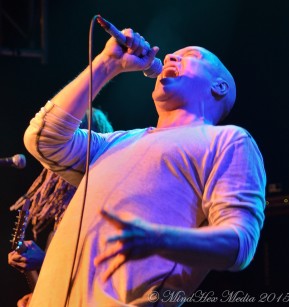
MGM: Do you hope he’ll pick up a guitar as well?
DR: He’s only playing stuff he’s playing on the keyboards a lot. He plays keyboards at least once a day, he’ll go on put the headphones on and just go through patches and play what everybody wants him to play. But my hope for him is that he’s just happy, whatever it is that brings him joy.
MGM: Which is all you can hope for….
DR: I don’t care if he’s an artist or policeman or gay or straight or rich or poor any of that stuff, I just want him to follow his passion. And so what I’m going to do as a father as he’s growing up, is just keep introducing him to different stuff and whatever he gets into I’m going to just support it. When he’s done with that I’m not going to go ”Hey, dude you’ve been studying hockey for the last ten years. Why are you quitting?”, I’m not going to do that. I’m going to go ”You’re done playing hockey, okay, what do you want to do?”. Whatever it is….
So with a new album due in May 2016, a reformed band once again back at the top of their game, who knows what the next few years will bring for the Dan Reed Network. Please rejoin us when we publish Part 2 of the interview with Dan where we look at the state of US politics, the fear of having Donald Trump as President, the plight of native Americans, life in the middle east, how the rise of ISIS affects us all and more. It’s truly gripping stuff.
